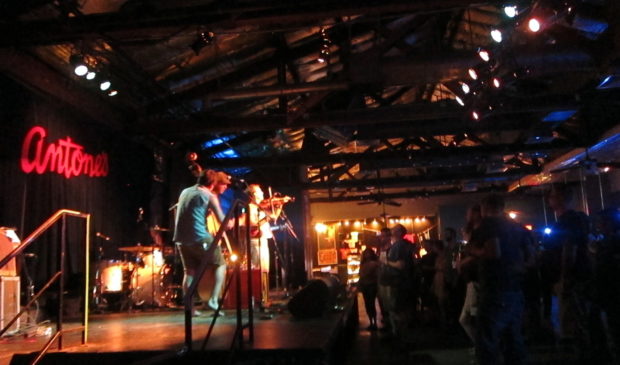Cultural trust leaders lay out priorities for $16.9M to help arts and music spaces
Tuesday, November 9, 2021 by
Chad Swiatecki The city plans to set up a pipeline of creative spaces to invest in and preserve in the coming years using dollars allocated after $16.9 million currently dedicated to that purpose is exhausted.
Leaders of the new economic development corporation that will execute the real estate deals envisioned with those dollars told the Music Commission last week that they plan to identify areas of need that could be helped through a combination of future bond proposals, hotel tax funds, philanthropy and other sources. The EDC plans to release later this month the request for proposals for Austin Cultural Trust, with existing and proposed creative spaces in line to have their properties purchased and managed in partnership with the city.
Anne Gatling Haynes, the EDC’s chief transactions officer, said the early goal is to preserve up to two “iconic” music venues that are under threat of closure or redevelopment, and establish one or two creative hub spaces that could offer space to a collection of creative groups. The $16.9 million comes from three sources: $12 million in creative spaces bond funding, the $2.4 million iconic venue pool that is funded by hotel tax revenues, and $2.5 million in General Fund dollars the city committed to cover losses in hotel tax receipts due to the Covid-19 pandemic.
The first deadline for the cultural trust RFP is Dec. 17, which Gatling Haynes said will allow staff to evaluate which projects are already in operation but at risk, or in progress but may need assistance for completion.
“We’re hoping that by developing a pipeline we can really identify how much money it will potentially take to secure the existing arts, music and cultural ecosystem in the city for the long term,” she said. “The goal is to continue to look at avenues for raising additional funds. Right now we’re focused primarily on the bricks-and-mortar development side, and there’s certainly other things this ecosystem needs, from programming endowments to efficiencies in operations.”
Last week the EDC held an online panel with cultural and real estate experts to give guidance to cultural trust applicants on how to navigate the process and increase their chances of success.
David Steinwedell, a member of the EDC board and veteran of the area’s real estate market, said current operators should have a clear vision of what they need in their next project.
“You all are cultural venues and you’re experts at what you do, whether there is music or art or you know something else that’s in the cultural realm. You’re not a real estate firm so you know you shouldn’t expect that you have expertise around a lot of these terms and activities, but you can align yourself with people who are experts,” he said.
“Know what you’re bringing to a space, because that adds to your negotiation strength,” he added. “If you’re an organization that only has people showing up at night you could be in a location that has a bunch of day users and your parking doesn’t conflict with anybody else who’s in the building, and you could be really valuable.”
Matt Kwatinetz, a consultant for the EDC, said operators should get as many potential spaces in consideration as possible so they don’t limit their bargaining power on a lease or purchase deal. He said being creative toward finding partners for underused portions of a property will increase the chance of success, with a 70 percent utilization rate as a goal.
“Every hour booked in every space reduces the cost to every other hour,” he said.
“If you only book two hours a week it’s got to pay for the whole week’s cost, and if you book 24 hours a day it splits it 24 ways in terms of what the cost is. Every cent paid by someone else is one cent less paid by the other people, so filling that space as much as possible is really important.”
Photo made available through a Creative Commons license.
The Austin Monitor’s work is made possible by donations from the community. Though our reporting covers donors from time to time, we are careful to keep business and editorial efforts separate while maintaining transparency. A complete list of donors is available here, and our code of ethics is explained here.
You're a community leader
And we’re honored you look to us for serious, in-depth news. You know a strong community needs local and dedicated watchdog reporting. We’re here for you and that won’t change. Now will you take the powerful next step and support our nonprofit news organization?











